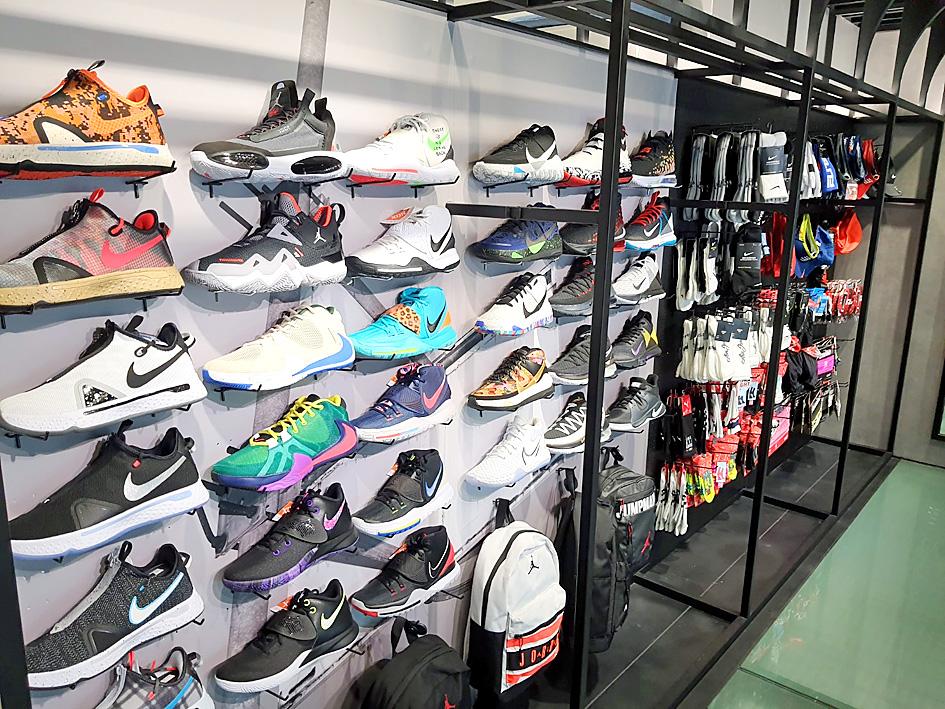Shoemaker Pou Chen Corp (寶成工業) on Friday reported net profit of NT$4.64 billion (US$155.67 million) in the first quarter of the year, down 26.1 percent from a year earlier, but still the second-highest net profit for the period in the company’s history.
The world’s largest contract maker of branded athletic and casual footwear also has investments in retailing and land development, as well as in financial services providers such as Nan Shan Life Insurance Co (南山人壽).
Pou Chen said the lower profit was largely due to fewer investment gains from Nan Shan, compared with a year earlier. The company booked NT$2.63 billion in investment gains from Nan Shan for the first quarter, down from the NT$4.69 billion it booked over the same period last year, it said in a statement.

Photo: Hung Mei-hsiu, Taipei Times
As the company’s non-operating profit also declined by 28.2 percent year-on-year to NT$4.19 billion in the quarter from January to March, its earnings per share were NT$1.57, down from NT$2.13 a year earlier, the company’s financial report showed.
Gross margin was 24.1 percent, down from 25.7 percent a year ago, while operating margin dropped to 3.8 percent, from 4.8 percent, the report showed.
First-quarter revenue decreased 5.1 percent year-on-year to NT$67.26 billion, as its retail business in shoes and sports products was negatively affected by COVID-19 flareups in China, despite steady improvement in its shoemaking operations, Pou Chen said.
The company’s original equipment manufacturing (OEM) shoe business generated sales of NT$42.88 billion in the first quarter, up 10.7 percent year-on-year on the back of rising shipments and higher product prices, it said.
The company shipped about 70.9 million pairs of shoes last quarter, an annual increase of 3.8 percent, while average selling prices were US$19.65 per pair, higher than the US$17.79 a year earlier, it said.
The OEM shoe business for international brands such as Nike Inc, Adidas AG, Asics Corp, New Balance Athletic Shoe Inc, Timberland Co and Salomon SAS made up 63.8 percent of the firm’s total revenue last quarter, it said.
The majority of Pou Chen’s shoe production is in Vietnam, Indonesia and China, accounting for 35 percent, 49 percent and 10 percent respectively of the company’s total production last quarter.
Its retail business — operated by Hong Kong-listed subsidiary Pou Sheng International Ltd (寶勝國際) — saw sales decrease by 24.5 percent from the previous year to NT$24.14 billion, due to strict COVID-19 restrictions in China, Pou Chen said.
The retail business comprised 35.9 percent of Pou Chen’s revenue last quarter, it said.
As of the end of the first quarter, Pou Sheng operated 8,186 stores, compared with 8,417 a year earlier, Pou Chen said.

CHIP WAR: Tariffs on Taiwanese chips would prompt companies to move their factories, but not necessarily to the US, unleashing a ‘global cross-sector tariff war’ US President Donald Trump would “shoot himself in the foot” if he follows through on his recent pledge to impose higher tariffs on Taiwanese and other foreign semiconductors entering the US, analysts said. Trump’s plans to raise tariffs on chips manufactured in Taiwan to as high as 100 percent would backfire, macroeconomist Henry Wu (吳嘉隆) said. He would “shoot himself in the foot,” Wu said on Saturday, as such economic measures would lead Taiwanese chip suppliers to pass on additional costs to their US clients and consumers, and ultimately cause another wave of inflation. Trump has claimed that Taiwan took up to

A start-up in Mexico is trying to help get a handle on one coastal city’s plastic waste problem by converting it into gasoline, diesel and other fuels. With less than 10 percent of the world’s plastics being recycled, Petgas’ idea is that rather than letting discarded plastic become waste, it can become productive again as fuel. Petgas developed a machine in the port city of Boca del Rio that uses pyrolysis, a thermodynamic process that heats plastics in the absence of oxygen, breaking it down to produce gasoline, diesel, kerosene, paraffin and coke. Petgas chief technology officer Carlos Parraguirre Diaz said that in

Japan intends to closely monitor the impact on its currency of US President Donald Trump’s new tariffs and is worried about the international fallout from the trade imposts, Japanese Minister of Finance Katsunobu Kato said. “We need to carefully see how the exchange rate and other factors will be affected and what form US monetary policy will take in the future,” Kato said yesterday in an interview with Fuji Television. Japan is very concerned about how the tariffs might impact the global economy, he added. Kato spoke as nations and firms brace for potential repercussions after Trump unleashed the first salvo of

SUPPORT: The government said it would help firms deal with supply disruptions, after Trump signed orders imposing tariffs of 25 percent on imports from Canada and Mexico The government pledged to help companies with operations in Mexico, such as iPhone assembler Hon Hai Precision Industry Co (鴻海精密), also known as Foxconn Technology Group (富士康科技集團), shift production lines and investment if needed to deal with higher US tariffs. The Ministry of Economic Affairs yesterday announced measures to help local firms cope with the US tariff increases on Canada, Mexico, China and other potential areas. The ministry said that it would establish an investment and trade service center in the US to help Taiwanese firms assess the investment environment in different US states, plan supply chain relocation strategies and